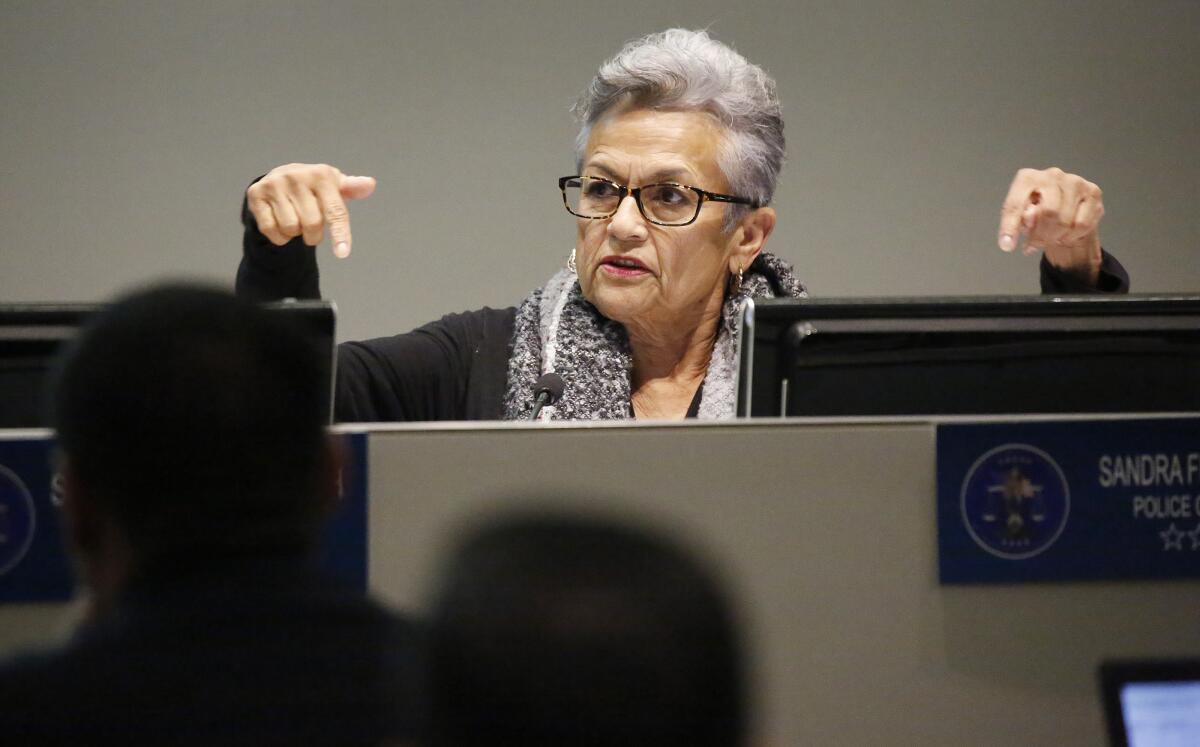Why the LAPD commissioner doesn’t speak in meetings

- Share via
A civilian panel that oversees the Los Angeles Police Department serves as the “citizens’ voice” in police affairs, but one of its members rarely asks questions or participates in discussions, records show.
Police Commissioner Sandra Figueroa-Villa asked only 10 questions from June 2018 to May 2019, according to a Times review of thousands of pages of public meeting transcripts. That includes an eight-month stretch in which she asked just one question.
Figueroa-Villa’s lack of participation has drawn the ire of activists who attend the weekly meetings. Many call her “Silent Sandra.”
Hamid Khan, a coordinator with the Stop LAPD Spying Coalition and a commission critic, called Figueroa-Villa a “shock absorber” because she rubber-stamps the department’s wishes.
“She is present at the meetings, but she is completely absent,” he said. “Sandra Figueroa-Villa embodies what is wrong with the Police Commission. We are extremely concerned.”
Figueroa-Villa dismissed the criticism. She said she works tirelessly behind the scenes on commission subcommittees and with police leaders. She also stressed she attends numerous community events and takes countless phone calls when concerned residents have issues with the LAPD.
“They’re hateful. They say things that are mean-spirited,” Figueroa-Villa told The Times in her office at police headquarters. “To me, I don’t represent the community that is hateful and disrespectful. I don’t represent that.”
By comparison, Commissioners Steve Soboroff and Shane Murphy Goldsmith asked about 153 and 68 questions, respectively, in the same 12 months. Commissioners Dale Bonner, who joined the panel in August 2018, and Eileen Decker asked more than 250 and 150 questions, respectively.
Matt Johnson, who stepped down from the Police Commission in 2018, said it is unfair to judge commissioners solely on the questions they ask in meetings. Figueroa-Villa, he said, is connected to the community and listens to residents.
“She is very engaged,” he said.
As a lifelong activist, Figueroa-Villa said she works to make sure the LAPD treats citizens fairly. She said she “didn’t ask to be appointed to anything” and joined the commission as a favor to Mayor Eric Garcetti. Once she joined, Figueroa said activists started attacking her when she asked questions.
Garcetti declined to comment. His spokesman said Figueroa-Villa serves with passion and integrity and that the mayor is proud to serve alongside her.
The criticism increased in 2016 after she battled an aggressive form of breast cancer, she said, saying activists wished her ill at meetings. The illness forced her to miss 20% of the meetings, but Figueroa-Villa said she attended them once she felt better.
“I came to commission meetings rocking my bald head,” she said. “That’s just me. That is what helped me heal.”
One of the most important roles for members of the Los Angeles Police Commission is to decide whether police shootings and other serious uses of force violate department policies. Two days before each meeting, Figueroa-Villa said she reviews the agenda and calls the commission executive director and police leaders with questions.
The public, she said, doesn’t attend the weekly meetings because activists fill the room with hostility and spew anger at commissioners and police leaders. If other residents attend and try to speak, activists disrupt the meeting to stop them from commenting, she added.
“Leadership is different for everyone,” Figueroa-Villa said. “I don’t need to sit on the dais and ask the same questions just to speak. My leadership style is just that.”
Terry Cooper, professor emeritus at USC’s Price School of Public Policy, said commissioners need to play an active, interested and knowledgeable role to provide oversight. The commission president, he said, should “consult privately with those who rarely speak about the importance of their participation.”
“Appointees should make commission meetings a top priority or not accept the appointment,” Cooper said.
More to Read
Sign up for Essential California
The most important California stories and recommendations in your inbox every morning.
You may occasionally receive promotional content from the Los Angeles Times.














